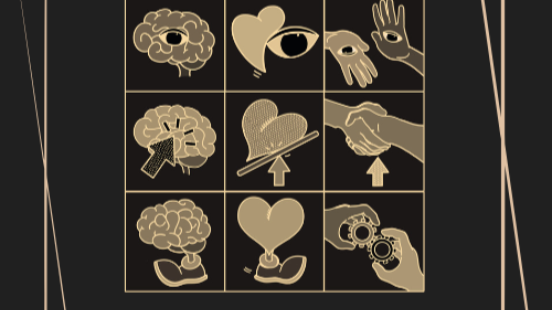Take the survey https://su.vc/ttpbypp
Hospitality management is considered a highly demanding role requiring significant emotional labour. Hospitality managers are consequently vulnerable to burnout.
In the following blogs I will extract some parts of my research conducted in 2019.
The aim is to increase awareness about managers' wellbeing in general.
The study is still open an you can participate here https://forms.gle/HpcMXELXxYCFBtQM8
This study aimed to assess whether different work orientations (job, career or calling) can predict burnout (as measured through emotional exhaustion and disengagement) among hospitality managers.
Self-report questionnaires were filled in by 212 hospitality managers, from 19 countries. Of these, a sample of 83 completed questionnaires was retained.
The results revealed that 9,6% of the respondents saw their work as a job, 45,8% held a career outlook and 44,6% held a calling orientation. Additionally, 89% were experiencing burnout, and 15.6% presented high levels of emotional exhaustion and disengagement.
Stepwise regressions aiming to predict emotional exhaustion and disengagement revealed work orientation the strongest predictor of both, with those seeing their work as a calling showing lower levels of exhaustion and disengagement compared to other orientations.
These findings suggest that a calling work orientation can buffer against emotional exhaustion and disengagement in the context of hospitality management. Keywords: burnout, disengagement, emotional exhaustion, hospitality manager, life satisfaction, positive psychology, work orientation

1. Introduction
In 2009, Schaufeli, Leiter and Maslach estimated the number of books, articles and studies, about burnout to exceed 6000 publications (Schaufeli, Leiter and Maslach, 2009). As workers, hospitality managers’ (HMs) were included in research on the general population, yet the researcher has identified a lack of research explicitly related to HMs’ wellbeing.
In the hospitality industry, competitive advantage is achieved by the combination of a differentiated product and flawless service. The responsibility for continuous service excellence rests with the HMs, who are expected to lead their teams positively and set the example of perfection (Buick & Thomas, 2001; Hartman, 1999; Marques, 2007). One of the reasons for which working in the hospitality industry is challenging is the frequency of personal interactions, with the requirement that one has to make the guest happy whatever it takes (Chu, Baker, & Murrmann, 2012; Robinson, 2008). Hochschild’s (1983) description of emotional labour (EL) as ‘a show’ is demonstrative of the experience of the hospitality worker. The employee performs the role of an actor, with the customer being an interactive audience, while the hotel or restaurant is the scene. The actor is expected to perform flawlessly, please, adapt to and exceed the audience’s expectations. Simultaneously, the actor needs to respect the scenes’ standards of quality and attitude. From the very first day in their role, HMs play the leading role in the piece, while concurrently they are responsible for creating the conditions enabling all the other actors to perform, 24 a day and seven days a week.
Some suggested actions to prevent burnout are unrealistic for HMs. For example, Buick and Thomas (2001) recommended fixed working times with no split shifts and identified guaranteed days to rest, preferably consecutive days acceptable to the HM’s partner. In their 2001 study they also demonstrated how the frequency of personal interactions as well as lack of control over one’s tasks, had been proven to contribute to emotional exhaustion (EE) and burnout. Also, EL or the suppression of one’s feelings and faking expressions, has been proven HOSPITALITY MANAGERS’ WELLBEING Student U1637298 – Module GC7918 – Term 2, 2019 6 to be a major component of EE and burnout because it leads to emotional discomfort and stress (Grandey, 2000; Lee & Ashforth, 1996; Zapf, 2002).

There is no doubt that people experiencing burnout do not feel well. Work on potential profiles at risk has also demonstrated that before burnout occurs, there is engagement and a positive state of mind. Maslach and Leiter presented burnout in 1997 as the ‘erosion of a positive state of mind’ or other words ‘engagement’ (Maslach & Leiter, 1997, p.24). The researcher felt it was time to draw attention to the specific population of HMs in order to create awareness and motivate further research on the aetiology and impact of EE, disengagement (DE) and burnout with a view to implementing positive preventions measures in hospitality education and organisations. Hence, this study aimed to determine the current levels of EE, DE and burnout among HMs. The possible relationships between EE, DE, work orientation (WO) and life satisfaction (LS) were explored, as well as some additional occupational and demographic variables, before attempting to identify whether any warning signs would enable one to predict EE and DE.
This paper is comprised of three parts. It begins with a literature review, evoking definitions of wellbeing, LS, WO and burnout, leading to the study’s hypotheses and research questions. The second part is a presentation of the sample and methods used in this empirical quantitative study. Finally, the outcomes of the research and limitations are detailed
This is an extraction from:
Hospitality managers’ well-being: Emotional exhaustion, disengagement and the relationship with work orientation and life satisfaction
Hrafnhildur Krumma Jonsdottir
Student n°: U1637298 School of Psychology,
University of East London, Water Lane, London
Programme: MAPPCP Term: 2-2019 Submitted on May 14th 2019
Module leader: Dr Rona Hart











